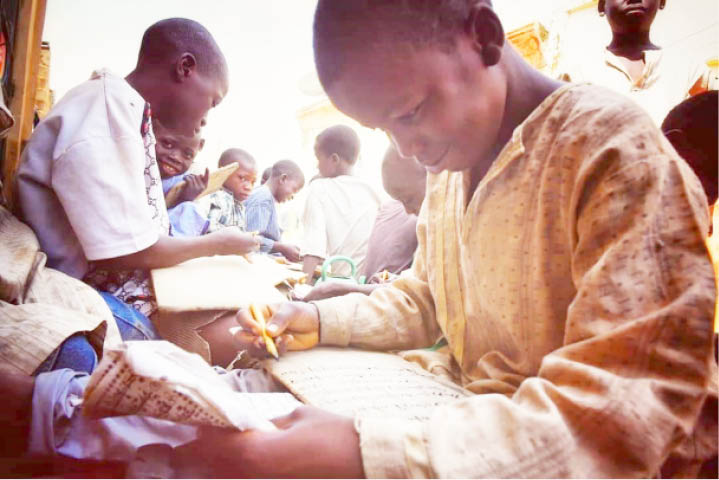According to a UNICEF report, Nigeria has the highest number of out-of-school children in the World. About 13.2 million children in the country do not have access to primary education.
Sadly, of this figure, the north of the country has 10.1 million, that is, almost 90 per cent of the total number.
A number of reasons could be given as responsible for the outrageous number, especially in the region. For instance, since the beginning of the Boko Haram insurgency in 2009, millions, especially children of school age had dropped out of school and found themselves in a new abode — IDP camps.
According to a report from a Displacement Tracking Matrix (DTM), which is an assessment of internally displaced persons, globally carried out by International Organization for Migration, (IOM), stated that, currently, there are over two million displaced persons in the North East, with the majority being school age children.
To checkmate this anomaly, there must be synergy between government, development partners and INGOs, in resettling school-age children. Temporal or makeshift learning centers should be erected within IDP camps across the region, in order to fill the vacuum, as a fallout of school closure arising from years of insurgency.
Making huge investments in resettling, specifically, school age children is indeed a panacea for peace in the region, and a stride in preventing ready recruits for terrorist groups. Once school-age IDPs are granted access to school, most of their productive time would be spent learning and engaging in skill acquisition, which, would deter them from joining any insurgents or criminal groups that could explore their vulnerability and gullibility to recruit them into their fold.
Such a mechanism if adopted by stakeholders would invariably halt the rising number of out-of-school children.
The North West is the worst hit by the number of out-of-school children in the country. It accounts for almost 56 per cent of the total number, that is, in spite of requisite interventions like the School Feeding Program and free education policy of various states. Undoubtedly, a major factor which aggravated the situation is renewed insecurity — banditry, kidnap-for- ransom and other criminalities in recent years.
Schools, unfortunately, became the soft target for assailants and other criminal gangs, where they constantly abduct school children for ransom.
According to a report by Global Coalition to Protect Education from Attacks, an inter-agency coalition formed to address the menace of attacks on schools during conflict says, “Between 2015-2019, there were 100 reported attacks on schools in Nigeria, and, such attacks have been on the increase between 2020 and 2021.
Katsina, Zamfara, Kebbi, Kaduna and Sokoto states had their fair share of attacks on schools, which, led to the closure of some schools by state governments.
Unfortunately, the north is adjudged educationally disadvantaged, due to historical and political perspectives. Political and community leaders, alongside stakeholders, must be proactive in changing the narrative. The situation had assumed a volatile and dangerous dimension. Bandits considered schools as a soft target for a number of reasons — easy-get-away and huge ransom. The government so far hasn’t demonstrated willingness to bring to an end, senseless abductions of school children, since the (in)famous Chibok kidnapping in 2014.
The Safe School Declaration, (SSD), which is a political commitment to protect education during armed conflict, has been endorsed by 108 UN member states, including Nigeria. By virtue of its membership, it is expected we see a paradigm shift from the lackluster behavior of the Nigerian State in areas of education and securing of schools. Mere proclamations of schools as safe, without requisite majors, will be futile.
There are a number of methods to adopt in ensuring full implementation of the SSD, at least, in practical terms. Government must identify high-risk schools, their proximity to town and security facilities or outfits. It equally, must ensure the presence of security personnel and provide a round- the-clock surveillance of the premises. In other words, schools must be heavily fortified like a military base with sentries keeping watch.
Only recently, the Nigerian President, Muhammadu Buhari alluded to the danger posed by attacks and abductions of school children, when he declared that, about 12 million schoolchildren are currently traumatized and morbidly scared of going back to school.
Cultural and historical anecdotes were identified as some major determinants of school enrollment in northern Nigeria. Early marriage, especially girl-child has, for decades, remained a significant factor stagnating access to formal education. However, there was a marked improvement, as a record number of enrollment was achieved, in the last decade.
Although on paper, the SSD looks quite promising and ambitious but the implementation of good policies had always been our bane. Whether those responsible for the adoption and implementation of the SSD will make good work, in securing schools and increasing enrollment, remains to be seen.
By Abdullahi D Mohammed who is with the Department of Political Science and International Studies at the Ahmadu Bello University, Zaria.

 Join Daily Trust WhatsApp Community For Quick Access To News and Happenings Around You.
Join Daily Trust WhatsApp Community For Quick Access To News and Happenings Around You.


